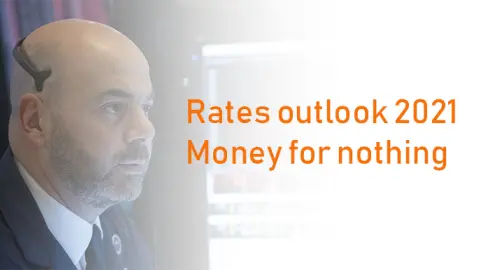EUR swap spreads: Diverging trajectories
Supply remains the main driver of swap spreads, but 2021 will be uneventful on this front. Instead, technical factors should cheapen long-dated swap spreads relative to shorter ones
Supply is still the main factor, but is largely played out
The cheapening of German government bonds relative to Euribor swaps continued in 2020.
If one can point to the structurally higher government borrowing needs in 2020 as a driver, the same cannot be said for 2019, when the move in swap spreads was even sharper. This narrative remains nonetheless valid; we see the cheapening of government bonds relative to swaps in recent years as marking the end of an era, that of ever wider German fiscal surpluses.
The same holds true for 2021, although we think the ‘supply-driven’ swap spreads' re-pricing has now fully played out. Instead, we anticipate the 2021 regime will be dominated by changes in risk premia (typically richening bonds against swaps in times of stress and vice versa). We take an uncharacteristically upbeat view of the risk environment in 2021, and thus see no reason to expect an unwind of the recent richening.
Diverging fate at the short and long end
Money market conditions conspire to a roughly unchanged state of play. With the extension of easy TLTRO (Targeted Longer-Term Refinancing Operations) terms that we’re anticipating in December - effectively cheaper liquidity to banks - the contribution from the Euribor-€STR spread should be minimal. On the other hand, some degree of richening could come from less government reliance on money market instruments, and so from lower repo rates.
We expect 10Y swap spreads to cheapen relative to 2Y
The first quarter of 2021 should see a further unwinding of the supply-related richening of long-dated swap spreads seen in the last quarter of 2020. In addition, governments ‘terming out’ their borrowing (relying less on T-bills and more on longer-dated bonds) should contribute to a stabilisation of the cheapening of short-dated swap spreads. This should result in a flattening of the swap spreads' term structure (cheaper long-end and richer front-end).
German supply/demand balance again flipped
Debt agencies have indicated so far that gross debt issuance is unlikely to fall materially next year. We still see it in the ballpark of €1.2 trillion for the entire eurozone after an estimated €1.26 trillion this year. In net terms that is a move from more than €560bn to below €530bn as redemptions fall to a smaller degree.
On the demand side, the ECB has become a dominant factor since it launched the Pandemic Emergency Purchase Programme (PEPP). Here alone €700bn of firepower is still left, and the ECB may add substantially to its purchase volume at the upcoming December meeting – our economists reckon €500bn.
Old and new programmes combined, the ECB could buy just shy of €1 trillion (net) in government bonds in 2021.
German net issuance after QE to turn even more negative again

The supply and demand balance is especially lopsided for Germany, the eurozone’s benchmark issuer. The 2021 budget plan suggests bond issuance will remain in the region of €235bn next year; after redemptions that leaves a net of €83bn. Given how the ECB splits its purchases, we estimate it should buy more than €200bn (net) over the course of next year in German government bonds alone. Of this already scarce ‘commodity’ – a highly liquid risk-free asset - the ECB is set to drain €120bn.
The crucial difference with the previous episode of bond scarcity in 2016 is that the ECB's tools have since evolved. The PEPP can now buy money market instruments. Add to this that the ECB can lend securities it has bought, and the price distortions should be less severe.
This publication has been prepared by ING solely for information purposes irrespective of a particular user's means, financial situation or investment objectives. The information does not constitute investment recommendation, and nor is it investment, legal or tax advice or an offer or solicitation to purchase or sell any financial instrument. Read more
Tags
Rates outlookDownload
Download article
19 November 2020
Rates Outlook 2021: Money for nothing This bundle contains 12 Articles
